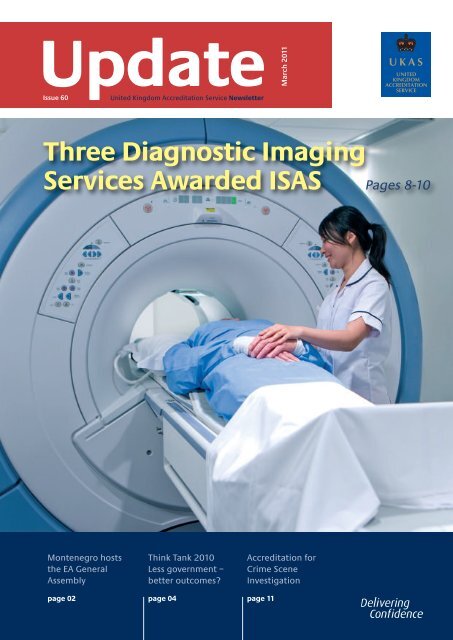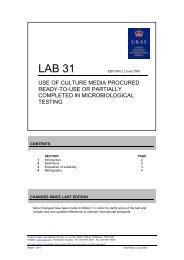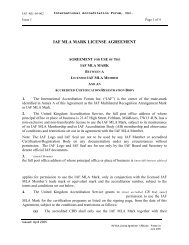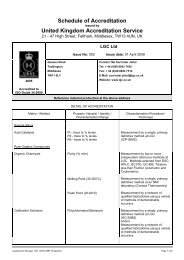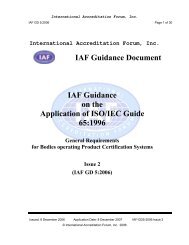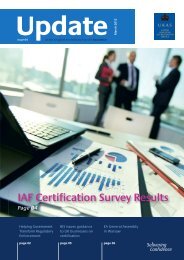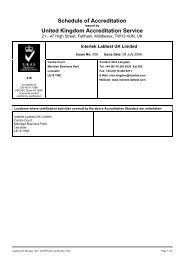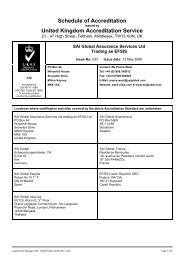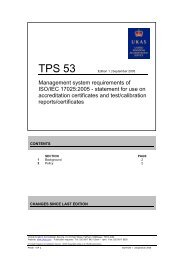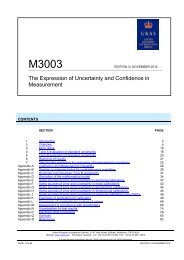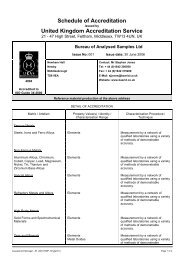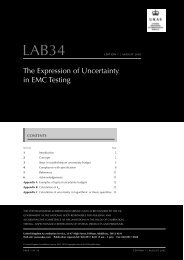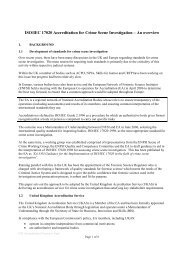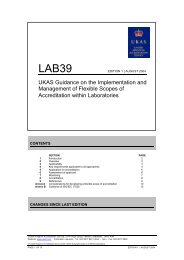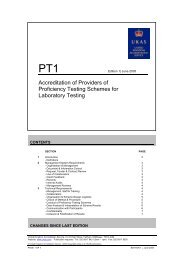Update 60 - The United Kingdom Accreditation Service
Update 60 - The United Kingdom Accreditation Service
Update 60 - The United Kingdom Accreditation Service
You also want an ePaper? Increase the reach of your titles
YUMPU automatically turns print PDFs into web optimized ePapers that Google loves.
<strong>Update</strong><br />
March 2011<br />
Issue <strong>60</strong><br />
<strong>United</strong> <strong>Kingdom</strong> <strong>Accreditation</strong> <strong>Service</strong> Newsletter<br />
Three Diagnostic Imaging<br />
<strong>Service</strong>s Awarded ISAS Pages 8-10<br />
Montenegro hosts<br />
the EA General<br />
Assembly<br />
page 02<br />
Think Tank 2010<br />
Less government –<br />
better outcomes?<br />
page 04<br />
<strong>Accreditation</strong> for<br />
Crime Scene<br />
Investigation<br />
page 11
Montenegro hosts the<br />
EA General Assembly<br />
<strong>The</strong> 26th General Assembly of the European cooperation for <strong>Accreditation</strong> was held in Budva,<br />
Montenegro on 24 and 25 November 2010. Montenegro is now an official candidate<br />
country of the European Union and its accreditation body, ATCG, will be eligible to become<br />
an Associate Member of EA during 2011. <strong>The</strong> meeting was formally opened by the then<br />
Minister of Economy of Montenegro, Mr Branko Vujovic. UKAS Chief Executive Paul<br />
Stennett participated on behalf of UKAS.<br />
<strong>The</strong> General Assembly discussed a wide<br />
range of topics that are important for<br />
the continued growth and development<br />
of EA as the official accreditation<br />
infrastructure in Europe. A revision of<br />
the Articles of Association and Rules of<br />
Procedure was agreed, to build upon an<br />
earlier revision completed in December<br />
2009.<br />
<strong>The</strong> General Assembly discussed the<br />
outline EA Strategy for the years 2010-<br />
2015, and mandated the Executive<br />
Committee to implement the proposals<br />
taking into account the various comments<br />
made at the meeting.<br />
It was agreed to sign a Framework<br />
Partnership Agreement and Operating<br />
Grant Agreement with the European<br />
Free Trade Association (EFTA). In order<br />
to support both this and the parallel<br />
agreements with the European<br />
Commission, internal processes and<br />
procedures of EA were also agreed.<br />
<strong>The</strong> General Assembly resolved that ISO<br />
14065 (Greenhouse gases – Requirements<br />
for greenhouse gas validation and<br />
verification bodies for use in accreditation<br />
or other forms of recognition) is identified<br />
as a new standard within the EA<br />
Multilateral Agreement and that the<br />
EA Horizontal Harmonisation Committee<br />
and the EA Multilateral Agreement<br />
Council start work as necessary to<br />
include the new activity and to prepare<br />
for the peer-evaluation process.<br />
Budva old town<br />
<strong>The</strong> Members of EA also considered the<br />
outcomes of the recent ILAC and IAF<br />
General Assemblies, and where necessary,<br />
passed resolutions to reinforce the<br />
implementation of these within the<br />
European accreditation region. Of<br />
particular note were the IAF Resolutions<br />
2010–09 (IAF/ISO Joint Communiqué on<br />
Expected Outcomes for Accredited<br />
Certification to ISO 9001 and ISO 14001)<br />
and 2010–10 (IAF/ISO Joint Communiqué<br />
on Certification to ISO 2<strong>60</strong>00). <strong>The</strong><br />
General Assembly also noted the<br />
resolutions of ILAC and IAF that agree<br />
that the responsibility for the scope of<br />
inspection be transferred from a joint<br />
IAF/ILAC activity to ILAC alone.<br />
Other topics considered by the General<br />
Assembly included:<br />
● A Contract of Cooperation was signed<br />
with the Egyptian <strong>Accreditation</strong><br />
Council (EGAC) of the Arab Republic<br />
of Egypt.<br />
● It was noted that it is planned to<br />
relocate the EA Secretariat’s office in<br />
Paris in early 2011.<br />
● Proposals to revise EA documents<br />
EA-3/01: Conditions for Use of<br />
<strong>Accreditation</strong> Symbols and Reference<br />
to MLA Signatory Status, and EA-2/05:<br />
<strong>The</strong> Scope of <strong>Accreditation</strong> and<br />
Consideration of Methods and Criteria<br />
for the Assessment of the Scope in<br />
Testing, were approved.<br />
● <strong>The</strong> General Assembly endorsed a<br />
new work item to prepare a guidance<br />
document on Witnessing Practices for<br />
Management System Certification.<br />
<strong>The</strong> next meeting of the EA General<br />
Assembly will be held in Berlin in May 2011.<br />
02 <strong>Update</strong> March 2011 www.ukas.com
UKAS Director recognised in New Year<br />
Honours List<br />
Dr Jane Beaumont MBE<br />
Dr Jane Beaumont, Director of<br />
<strong>Accreditation</strong> at UKAS, has been<br />
appointed as MBE in the New Year<br />
Honours list. <strong>The</strong> citation for the award,<br />
for services to industry, recognises the<br />
enthusiasm, determination and technical<br />
ability that Jane has brought to UKAS<br />
and its predecessor organisations. It<br />
mentions in particular that Jane has<br />
been at the forefront of developing<br />
innovative uses for accreditation,<br />
particularly in support of Government<br />
and the wider public sector, such as<br />
healthcare, the national DNA database<br />
and forensic science.<br />
On hearing news of her award, Jane<br />
said: “I am delighted and privileged to<br />
receive this award. It is a recognition of<br />
the hard work and commitment of all<br />
UKAS staff in delivering the UK’s national<br />
accreditation service. <strong>Accreditation</strong> is<br />
an increasingly important part of the<br />
business support infrastructure in the<br />
UK, helping to deliver confidence in<br />
goods and services. This award also<br />
acknowledges the growing influence<br />
and recognition of accreditation across<br />
all industry and business sectors as well<br />
as in many other aspects of everyday life.”<br />
Jane began her career working as a<br />
food analyst, before conducting doctoral<br />
and post-doctoral research at the Royal<br />
Botanic Gardens, Kew and Kings College,<br />
London. She joined one of UKAS’<br />
predecessor organisations as Technical<br />
Officer in 1987. Since then Jane has<br />
progressed to fulfilling the role of<br />
Director of <strong>Accreditation</strong> with overall<br />
responsibility for the delivery of<br />
established accreditation services and<br />
the development of new areas of<br />
accreditation. She has provided advice<br />
and training to emerging accreditation<br />
bodies overseas, as well as contributing<br />
to the development of European and<br />
international guidance on accreditation<br />
approaches in different technical areas.<br />
Jane was appointed Director of<br />
<strong>Accreditation</strong> in 2005 and is an<br />
Executive member of the UKAS Board.<br />
Lord Lindsay, UKAS Chairman said<br />
“I am delighted that Jane’s sterling work<br />
in helping to develop accreditation<br />
both in the UK and abroad has been<br />
recognised. UKAS as a whole can also<br />
take pride in this award, as it reflects<br />
what has been achieved by staff at all<br />
levels and on all fronts.”<br />
Technical Advisory Committees for<br />
Management System Certification<br />
UKAS has decided to review the Advisory<br />
Committees that exist to support the<br />
accreditation activities in the area of<br />
Management System Certification. As<br />
a result the decision has been taken to<br />
dissolve the existing committees for QMS<br />
and EMS, QMSAC and EMSAC, and replace<br />
them with a single technical advisory<br />
committee to support the accreditation<br />
of management system certification<br />
bodies. <strong>The</strong> scope of the new committee<br />
will be broader and will cover all the<br />
activities that are accredited under<br />
ISO/IEC 17021. <strong>The</strong> committee will also<br />
establish specific task groups and sub<br />
committees where necessary to support<br />
specific management system areas<br />
where there is a need to focus on issues<br />
unique to that particular area of<br />
management system certification, for<br />
example EMS and EMAS.<br />
<strong>The</strong> new Technical Advisory Committee<br />
will be established in accordance with<br />
UKAS procedures and UKAS will ensure<br />
that we have adequate technical<br />
expertise within the group as well as a<br />
balanced representation of interested<br />
parties. We are currently in the process<br />
of drafting the Terms of Reference for<br />
the Committee and determining the<br />
membership. Further information will<br />
be available on the UKAS website over<br />
the coming months.<br />
www.ukas.com <strong>Update</strong> March 2011 03
2010 Think Tank<br />
Less government –<br />
better outcomes?<br />
Lord Lindsay, UKAS Chairman, posed this question at a recent UKAS<br />
Think Tank event that considered the likely impact of the coalition<br />
Government’s interest in de-centralisation and reducing regulation.<br />
At the event, attended by an invited audience of<br />
senior government and business contacts, three<br />
keynote speakers were asked to consider how<br />
the spending review and related issues of<br />
reducing regulation and bureaucracy might lead<br />
to the greater use of alternative measures such<br />
as accreditation, inspection and certification.<br />
<strong>The</strong> challenge of change<br />
Kate Marshall, Deputy Director, Strategy Unit, Cabinet Office,<br />
focused on the challenge that government faces when tackling<br />
pressing policy issues, and how few can be addressed without<br />
thinking about the behaviour of individuals. Behavioural<br />
economics and behavioural science had provided valuable<br />
insights into why individuals don’t always behave as perfectly<br />
‘rational’ human beings. Marshall invited the audience to<br />
consider how difficult it sometimes is to achieve a seemingly<br />
simple and ultimately beneficial personal goal, like increasing<br />
our savings, or keeping up a fitness regime.<br />
Marshall said Governments often consider regulation when the<br />
long-term wellbeing of individuals or the wider community<br />
could be at risk. In responding to these situations, she<br />
confirmed the Coalition’s desire to develop policies that were<br />
less intrusive and imposed fewer costs on both business and<br />
society. Understanding how people behave and make decisions,<br />
and finding innovative ways to help ‘nudge’ individuals into<br />
making better, more informed choices were at the heart of<br />
the Government’s policy agenda.<br />
Devolved power: the need for specific limits and<br />
clear accountability<br />
Lord Bichard, Senior Fellow at the Institute for Government,<br />
drew upon his experience in local and central government to<br />
focus on the need for intelligent solutions. In particular he<br />
was concerned about the risks that overly detailed and<br />
prescriptive targets can represent – but he also highlighted<br />
the need to pass responsibility out from the centre and away<br />
from specialist silos.<br />
He saw successful government as one that is focused on<br />
outcomes rather than inputs and one that ensures<br />
accountability is spread logically. He emphasised the need to<br />
redesign the service not the structure. He speculated that<br />
less government is successful when it recognises the benefits<br />
of early intervention and prevention, and places the<br />
responsibility for this close to the ‘coal face’.<br />
Transformational rather than transactional change<br />
<strong>The</strong> final presentation from Sarah Veale, Head of Equality<br />
and Employment Rights at the TUC, came to a similar<br />
conclusion to the previous speakers, but from a slightly<br />
different view point. Focusing on the needs of employees<br />
and consumers as the potential beneficiaries of less<br />
government – she started by highlighting the risks this may<br />
represent – particularly the laws of unexpected consequences.<br />
Regulation can be removed, but only where there is an<br />
alternative solution and good buy-in from the relevant<br />
parties. <strong>The</strong> most successful route to lessening government<br />
is to encourage and set regulations that are led and<br />
implemented from the grass roots up.<br />
<strong>The</strong> ‘one in, one out’ approach was discussed as an<br />
opportunity to reduce poorly functioning and unnecessary<br />
regulations. <strong>The</strong> speaker liked the concept but highlighted<br />
the difficulty in achieving this, asking whether the kudos of<br />
removing legislation becomes as recognised as that of<br />
04 <strong>Update</strong> March 2011 www.ukas.com
Kate Marshall Lord Bichard Sarah Veale<br />
Lord Lindsay<br />
making it. <strong>The</strong>re would also need to be a clear measurement<br />
by which the replacement is marked against the outgoing<br />
regulation, in order to ensure it is ‘better’. <strong>The</strong> same system<br />
of measurement is needed to ensure the strategies being<br />
considered as an alternative to regulation are actually an<br />
improvement. <strong>The</strong> use of accreditation and standards has<br />
proved effective, but they are not suitable for every area. In<br />
promoting alternatives to regulation, it is vital to ensure that<br />
one onerous mechanism is not simply replaced by another.<br />
<strong>The</strong> influence of the media<br />
Key points raised in the open discussion highlighted the role<br />
of the media in influencing judgement, both for and against<br />
regulation. Illustrations of this were the typical labelling of<br />
new regulations as ‘nanny state’, compared with campaigns<br />
for action when things go wrong – such as the demand for<br />
the regulation of dangerous dogs. <strong>The</strong> consensus was that<br />
government should have a tool kit of approaches which<br />
should be used in consultation with all interested parties.<br />
Summary<br />
Summing up the debate, Lord Lindsay concluded that<br />
there was general agreement that better outcomes can be<br />
achieved with less government intervention provided that<br />
care is taken over what fills the void. A menu or package<br />
approach that matches the right solution to the problem<br />
should be the preferred route with standards and accreditation<br />
being considered as a valuable part of this multi-layered<br />
approach. He thought there was a clear message that the<br />
outcome or value of a proposed solution should be the<br />
over-riding focus, rather than the process involved in<br />
implementing it. But also an understanding that, if the right<br />
balance can be achieved, it will be to the benefit of<br />
Government, business and society as a whole. Lord Lindsay<br />
went on to assure those present that UKAS would continue<br />
to discuss with a wide range of government contacts how<br />
accreditation could make a greater contribution to the delivery<br />
of policy in these straightened times. He was encouraged<br />
that departments and agencies were increasingly turning to<br />
UKAS for help with a number of new policy initiatives.<br />
UKAS Think Tanks are organised, with the support of the<br />
Department for Business, Innovation and Skills, as part of the<br />
<strong>Accreditation</strong> Awareness Campaign.<br />
www.ukas.com <strong>Update</strong> March 2011 05
Global launch of<br />
IAF End User Survey<br />
<strong>The</strong> need for the International<br />
<strong>Accreditation</strong> Forum (IAF) to<br />
gain feedback from users of<br />
accredited services has been a<br />
long-standing issue for the IAF,<br />
and so a task force within the<br />
IAF Communications &<br />
Marketing Committee (CMC)<br />
was set up to launch an online<br />
survey. <strong>The</strong> survey aims to<br />
provide valuable insight into the<br />
drivers for certification, the<br />
importance of accreditation, and<br />
the value of the (Multilateral<br />
Mutual Recognition<br />
Arrangement) MLA.<br />
<strong>The</strong> survey was launched in over 55<br />
countries by Graham Talbot, Chair of<br />
the IAF CMC, at the Joint General<br />
Assembly in Shanghai on October 28.<br />
<strong>Accreditation</strong> Bodies have been sent a<br />
link to the survey together with<br />
instructions for promoting it in the local<br />
economy, including a letter template to<br />
send to Certification Bodies to encourage<br />
onward distribution.<br />
<strong>The</strong> survey will be promoted on the<br />
(International Laboratory <strong>Accreditation</strong><br />
Cooperation) ILAC, IAF and Regions’<br />
websites, and ISO CASCO has also<br />
agreed to promote it.<br />
If you would like to complete the survey<br />
please click on the link http://ukas.<br />
iafcertification.sgizmo.com<br />
<strong>The</strong> survey should take no longer than<br />
5 minutes to complete and your feedback<br />
is gratefully received.<br />
For further information, please contact<br />
Jon Murthy, IAF CMC Secretary<br />
(jon.murthy@ukas.com).<br />
<strong>The</strong> survey will last for one year (closing<br />
1 September 2011) and the results will<br />
be presented during the annual ILAC<br />
and IAF meetings to be held in Bangkok<br />
in November 2011.<br />
06 <strong>Update</strong> March 2011 www.ukas.com
<strong>The</strong> European Parliament building – Brussels<br />
Changes to the<br />
Assessment of Notified Bodies<br />
For some time UKAS has acted<br />
on behalf of various UK<br />
Government Departments/<br />
Agencies and other Authorities<br />
in the assessment of<br />
organisations wishing to be<br />
appointed as Notified Bodies<br />
for conformity assessment<br />
activities for many of the EU<br />
New Approach Directives.<br />
In response to a EU decision on a<br />
common framework for this marketing<br />
of products, a project is now underway<br />
to change the way in which such<br />
Notified Bodies are assessed for their<br />
conformity assessment activities. In<br />
future, conformity assessment bodies<br />
that wish to become Notified bodies<br />
will, in general, need to be accredited<br />
in accordance with the relevant ISO/IEC<br />
17000 or EN 4500 services standard<br />
and other Normative and Guidance<br />
documents; this represents a significant<br />
change in the process of appointing<br />
Notified Bodies and will help ensure an<br />
ongoing consistent and common<br />
approach across all Member States.<br />
UKAS has established a Steering Group<br />
for the project, involving, Competent<br />
Authorities and Notified Body<br />
representatives to implement and<br />
control this change over a two year<br />
transition period. <strong>The</strong> Steering Group is<br />
considering various aspects including<br />
the allocation of <strong>Accreditation</strong><br />
Standards to each EU Directive, and the<br />
process for recommending and<br />
approving appointments.<br />
This change is taking place across<br />
Europe and UKAS has recognised the<br />
need to ensure that the approach taken<br />
in the UK is equivalent to that used in<br />
other EU member states and ongoing<br />
communication is included within the<br />
transition programme.<br />
For further information please contact<br />
Kevin Belson, Technical Manager<br />
(kevin.belson@ukas.com).<br />
www.ukas.com <strong>Update</strong> March 2011 07
Three Diagnostic Imagin<br />
UKAS is delighted by the success of three very different diagnostic imaging s<br />
<strong>The</strong> Cobalt Unit Appeal Fund (Cheltenham Imaging Centre), 4 Ways H<br />
were all successfully able to demonstrate to UKAS assessment teams conform<br />
were formally presented with their ISAS certificates at separate presentation<br />
<strong>The</strong> Cobalt Unit Appeal Fund<br />
(Cheltenham Imaging Centre)<br />
became the very first diagnostic<br />
imaging service provider to be<br />
accredited by UKAS against the<br />
ISAS Standard in early November<br />
2010. <strong>The</strong> medical charity has over<br />
40 years experience delivering<br />
imaging services to NHS, private,<br />
and medical insurance clients.<br />
Cobalt successfully achieved their<br />
accreditation one year on from<br />
formally applying for ISAS. <strong>The</strong><br />
accreditation covers imaging<br />
activities delivered at the<br />
Cheltenham site and also<br />
mobile units.<br />
In recommending Cobalt’s accreditation,<br />
the assessment team commended<br />
Cobalt for employing the very latest<br />
state of the art technology and excellent<br />
facilities. During the assessment<br />
members of the local community<br />
described Cobalt’s staff as passionate,<br />
enthusiastic and approachable and were<br />
very appreciative of the excellent<br />
resources available to them locally.<br />
At a special ceremony held at Cobalt’s<br />
site in Cheltenham last year Lord Jamie<br />
Lindsay, UKAS Chairman, said: “UKAS is<br />
delighted to participate in this event<br />
which acknowledges the tremendous<br />
efforts made by all parties to achieve<br />
the first UKAS accreditation to the ISAS<br />
Standard. By participating in the<br />
accreditation process, Cobalt has not<br />
only shown its willingness to be open<br />
and transparent, but also that it is<br />
constantly working to develop and<br />
Lord Lindsay, UKAS Chairman, presents the accreditation certificate to Peter Sharpe, Chief<br />
Executive, Cobalt Unit Appeal Fund<br />
improve both clinical and patientrelated<br />
outcomes.”<br />
Peter Sharpe, Chief Executive, Cobalt<br />
on accepting the <strong>Service</strong>’s certificate<br />
said: “This is a very proud moment for<br />
all of us at Cobalt. Staff worked hard to<br />
achieve the ISAS accreditation, the<br />
process has been rigorous and<br />
challenging; it has helped us develop<br />
and improve services and also put<br />
in place a system for continual review<br />
and development. It is with great<br />
pleasure that we accept the ISAS<br />
<strong>Accreditation</strong> Certificate. We are also<br />
delighted to be the first ISAS accredited<br />
organisation, confirming that we provide<br />
a patient focused safe and efficient<br />
diagnostic imaging service.”<br />
In attendance at the ceremony were<br />
principal attendees from the owners of<br />
ISAS, <strong>The</strong> College of Radiographers (CoR)<br />
and <strong>The</strong> Royal College of Radiologists<br />
(RCR), the wider healthcare sector,<br />
dignitaries from Cobalt’s local community,<br />
and UKAS.<br />
During a series of speeches, Dr Jane<br />
Barrett, RCR President commented on<br />
the future for ISAS accreditation, said:<br />
“We congratulate Cobalt on its<br />
accreditation. We look forward to the<br />
accreditation of further diagnostic<br />
imaging services across the UK,<br />
highlighting radiology as a specialty<br />
leading on the highest standards of<br />
service provision and a real focus on<br />
quality improvement.”<br />
08 <strong>Update</strong> March 2011 www.ukas.com
g <strong>Service</strong>s Awarded ISAS<br />
ervice providers that have achieved UKAS accreditation to the ISAS Standard.<br />
ealthcare Ltd and <strong>The</strong> Blackpool Teaching Hospitals NHS Trust<br />
ity to the rigorous requirements of the ISAS Standard. All three organisations<br />
s to celebrate their achievements.<br />
Highlighting the increasing importance<br />
of accreditation in a changing health<br />
environment, Professor Audrey<br />
Patterson, SCoR Director of Professional<br />
Policy said. “It is great to see the first<br />
ever accreditation under ISAS. In the<br />
context of changes in commissioning of<br />
health care in England and of continuing<br />
scrutiny of quality care in all parts of the<br />
UK, it is more than ever appropriate that<br />
diagnostic imaging services are able to<br />
objectively demonstrate high standards<br />
of delivery. <strong>The</strong> core involvement of<br />
patients in the ISAS accreditation process<br />
adds even greater value to Cobalt’s<br />
achievement.”<br />
Paul Stennett, UKAS Chief Executive, presents the accreditation certificate to Dr Sanjiv Agarwal,<br />
Chief Executive, 4 Ways Healthcare seen here with Winifred Morley, Quality Manager, 4 Ways<br />
Healthcare<br />
Paul Stennett, Chief Executive,<br />
UKAS presented Dr Sanjiv Agarwal,<br />
Chief Executive, 4 Ways Healthcare<br />
Ltd and the team, the organisation’s<br />
certificate at their headquarter site<br />
in Hemel Hempstead, Hertfordshire.<br />
4 Ways Healthcare is a medically<br />
led specialist diagnostic reporting<br />
service currently working with more<br />
than 50 NHS organisations within<br />
primary and secondary care,<br />
delivering more than 100,000 reports<br />
in 2010. <strong>The</strong> accreditation covers<br />
the reporting activities delivered<br />
from their headquarter site.<br />
<strong>The</strong> assessment team commended the<br />
organisation for their rapid turn-around<br />
times, sub-speciality reporting and<br />
rigorous quality assurance.<br />
On receiving the organisation’s certificate<br />
Dr Sanjiv Agarwal, Chief Executive, 4 Ways<br />
Healthcare, said: “I am exceptionally<br />
proud in achieving this accreditation<br />
and believe it is testament to the hard<br />
work and diligence of our team. We<br />
have always shown a commitment to<br />
achieving the highest quality of radiology<br />
reporting; our clinical governance and<br />
rigorous recruitment process are central<br />
to this commitment. Preparation for<br />
the ISAS assessment helped our<br />
organisation step back and look at our<br />
processes objectively, subjecting them<br />
to increased scrutiny. We feel that<br />
positive improvements have been made<br />
to our internal processes and service<br />
provision by taking part in the assessment<br />
and aligning our processes and policies<br />
with the ISAS Standard. Now we have<br />
been accredited against the ISAS Standard,<br />
we have a high degree of confidence<br />
that we will comply with all other<br />
regulatory requirements, including <strong>The</strong><br />
Care Quality Commissions requirements.”<br />
Continued on page 10<br />
www.ukas.com <strong>Update</strong> March 2011 09
Three Diagnostic Imaging <strong>Service</strong>s<br />
Awarded ISAS continued<br />
<strong>The</strong> Blackpool Teaching Hospitals<br />
NHS Trust became the first NHS<br />
provider, and early implementer<br />
site to be accredited against the<br />
ISAS Standard. Dr Kane,<br />
Consultant in Radiology and<br />
Nuclear Medicine, Blackpool<br />
Teaching Hospitals NHS Trust<br />
accepted the certificate from<br />
Paul Stennett, Chief Executive,<br />
UKAS, the CoR and the RCR at the<br />
RCR’s headquarters in London.<br />
<strong>The</strong> organisation has a staffing<br />
complement of about 4,500 serving a<br />
population of approximately 330,000<br />
residents across Blackpool, Fylde and<br />
Wyre and almost 12 million holidaymakers<br />
who visit the area every year. <strong>The</strong><br />
accreditation covers a range of services:<br />
computerised tomography; magnetic<br />
resonance imaging; mammography;<br />
PACS, radiography; radiology nursing;<br />
teleradiology; therapeutic radiology<br />
procedures, and ultrasound delivered<br />
across the Trusts five sites: Blackpool<br />
Victoria Hospital; Fleetwood Hospital;<br />
Clifton Hospital; Whitegate Health Centre;<br />
and Lytham Primary Care Centre.<br />
In recommending the accreditation<br />
the assessment team commended the<br />
Trust on its proactive approach to service<br />
improvements highlighting a range of<br />
good practice in service delivery,<br />
innovative skills mix and high levels of<br />
implementation of staff appraisals.<br />
On hearing the news of their award,<br />
Dr Graham Hoadley, Consultant<br />
Radiologist and National Clinical Lead<br />
for <strong>Service</strong> Improvement, said: "We are<br />
so pleased at receiving this ISAS<br />
accreditation and particularly proud to<br />
be the first radiology/diagnostic imaging<br />
service to do so within the NHS. This<br />
confirms the high standards of care<br />
delivered by our team. We have a long<br />
history of effective service improvements<br />
Dr Tony Nicholson, Vice-President & Dean of the Faculty of Clinical Radiology, RCR; Dr Kane,<br />
Consultant in Radiology and Nuclear Medicine, Blackpool Teaching Hospitals NHS Trust; Richard<br />
Evans, CEO, SCoR and Paul Stennett, UKAS Chief Executive<br />
in radiology/diagnostic imaging and<br />
this is a well deserved reward for all our<br />
efforts. We are passionate about giving<br />
our patients peace of mind when making<br />
use of our services, and we believe that<br />
with this accreditation we can now<br />
demonstrate this commitment better<br />
than ever."<br />
Dr Tony Nicholson, Vice-President<br />
and Dean of the Faculty of Clinical<br />
Radiology, RCR commented: “Blackpool<br />
Teaching Hospitals NHS Trust can be<br />
very proud of being at the forefront of<br />
accreditation. Patients can be very sure<br />
that when they enter the radiology/<br />
diagnostic imaging departments in<br />
Blackpool they will receive a safe first<br />
class service.”<br />
Richard Evans, Chief Executive, SCoR<br />
added: “This accreditation recognises<br />
not only a great deal of work but also<br />
many years of commitment by the<br />
whole team towards developing and<br />
promoting quality diagnostic imaging<br />
services. It is particularly timely for the<br />
first NHS based service to gain<br />
accreditation. As the pathfinder GP<br />
commissioning consortia begin to<br />
explore how to obtain the best services<br />
for patients, Trusts such as Blackpool<br />
that can demonstrate objective quality<br />
measures should be obvious choices for<br />
commissioners and patients alike.”<br />
<strong>Accreditation</strong> of these three very<br />
different diagnostic imaging service<br />
providers demonstrates the flexibility of<br />
the ISAS Standard to objectively assess<br />
good practice, and that different<br />
organisations are able to deliver high<br />
quality patient focused care and<br />
continuous improvement.<br />
Since ISAS’ launch in June 2009 many<br />
imaging services, both public and<br />
private, have applied for assessment,<br />
and we are pleased to report further<br />
organisations are in the application<br />
process.<br />
For further information about the<br />
accredited imaging services and about<br />
ISAS visit: www.isas-uk.org<br />
10 <strong>Update</strong> March 2011 www.ukas.com
<strong>Accreditation</strong><br />
for Crime Scene Investigation<br />
To progress accreditation in the crime scene investigation area, UKAS,<br />
together with other key stakeholders, has developed a project plan to identify<br />
the internal and external arrangements necessary to facilitate the assessment<br />
and accreditation of applicant inspection bodies to ISO/IEC 17020.<br />
UKAS is running a pilot programme<br />
with selected applicants to testout<br />
the assessment methodologies<br />
during the pilot phase. This will<br />
permit development of the scheme<br />
on an ongoing basis. Once finalised,<br />
the assessment methodologies will<br />
then be applied in a similar manner<br />
to all other bodies subsequently<br />
seeking accreditation in this area.<br />
<strong>The</strong> pilot bodies will be subject to the<br />
same rigorous assessments as for all<br />
UKAS assessment activities, but there<br />
may be a requirement for additional<br />
assessment effort within the pilot if<br />
identified as essential to ensure a robust<br />
assessment process and an accredited<br />
inspection service that satisfies the<br />
demanding requirements placed upon<br />
it by the UK’s criminal justice system.<br />
All pilot bodies fully satisfying the pilot<br />
and accreditation criteria will be granted<br />
accreditation on the same date.<br />
<strong>Accreditation</strong> demonstrates the technical<br />
competence and the impartiality and<br />
integrity of the organisations offering<br />
scene of crime investigation services.<br />
UKAS accreditation offers transparent<br />
solutions that deliver:<br />
Public trust: confidence that forensic<br />
and forensic related activities are carried<br />
out impartially and competently.<br />
One stop shop: accreditation has a<br />
broad application across the Home<br />
Office, the Police service and Government<br />
as a whole, covering multiple sectors<br />
and multiple disciplines in a consistent<br />
way.<br />
Cost reduction: organisations operating<br />
efficiently and effectively with oversight<br />
by UKAS, reduce the need for regulators<br />
or organisations to establish their own<br />
assessment and approval activities.<br />
For further information on the pilot<br />
scheme please visit:<br />
http://www.ukas.com/media-centre/<br />
news/news-archive/2010/ISO_IEC<br />
_17020_for_Crime_Scene_<br />
Investigation.asp<br />
<strong>Accreditation</strong> has underpinned quality<br />
assurance of forensic analysis for almost<br />
20 years, ensuring confidence of analysis<br />
of samples and results produced in the<br />
laboratory. However, until now the<br />
examination of, and collection of materials<br />
from crime scenes has not been<br />
covered by accreditation. Accredited<br />
examination and collection of materials<br />
from crime scenes will provide<br />
additional confidence in the integrity<br />
and chain of custody of the materials<br />
being collected.<br />
www.ukas.com <strong>Update</strong> March 2011 11
UKAS Brochures<br />
UKAS is recognised in many sectors ranging from Asbestos, Chemicals, Explosives, Food,<br />
Forensics, Healthcare, Toys to Water. To help UKAS emphasise the importance of<br />
accreditation and enhance the awareness of accreditation in different sectors, UKAS has<br />
developed a wide range of brochures.<br />
All these brochures are available to download in PDF from the UKAS website<br />
http://www.ukas.com/media-centre/promotional-material-and-downl/brochures.asp<br />
A high resolution print PDF can be requested by email to communications@ukas.com<br />
<strong>The</strong> <strong>United</strong> <strong>Kingdom</strong> <strong>Accreditation</strong> <strong>Service</strong> (UKAS)<br />
<strong>The</strong> <strong>United</strong> <strong>Kingdom</strong> <strong>Accreditation</strong> <strong>Service</strong><br />
Why we matter<br />
What we do<br />
Who we are<br />
UKAS-accredited services – a guide for small to medium businesses<br />
Do you use certification, testing,<br />
calibration or inspection services?<br />
If so…<br />
save time and money<br />
by using UKAS-accredited services<br />
Who is doing your calibration work?<br />
Are you confident that your goods and<br />
services and their component parts are<br />
based on measurements taken with<br />
correctly calibrated measuring equipment?<br />
UKAS Corporate brochure Guide for small to medium businesses Calibration services<br />
UKAS <strong>Accreditation</strong><br />
A BRIEFING FOR COMMISSIONERS OF HEALTHCARE SERVICE S<br />
<strong>Accreditation</strong>: Underpinning Quality<br />
Healthcare Commissioning<br />
<br />
<br />
<br />
<br />
<br />
<br />
<br />
<strong>The</strong> need to drive up the quality of care for patients, whilst delivering<br />
efficiency and productivity, is a key principle for commissioners of<br />
healthcare services. UKAS accreditation is a tool that can be used to<br />
support the commissioning of healthcare services that are safe, effective<br />
and that continually improve the experience for patients.<br />
<strong>The</strong> influence and use of UKAS accreditation recognised standards. In response to a<br />
continues to grow across a wide range of new European Regulation (Regulation<br />
areas to support the delivery of informed EC 765/2008), UKAS has been formally<br />
and effective purchasing, good governance appointed as the National <strong>Accreditation</strong><br />
and public confidence. As pressure on Body providing for the first time, a legal<br />
finances continues to build, accreditation basis for accreditation.<br />
is increasingly being seen as an effective<br />
way for purchasers to deliver ‘more for less’. UKAS is becoming increasingly active in<br />
the Healthcare sector. Details of areas<br />
<strong>The</strong> <strong>United</strong> <strong>Kingdom</strong> <strong>Accreditation</strong> <strong>Service</strong> supported by UKAS accreditation are given<br />
(UKAS), as the national accreditation body, in this briefing. When commissioning<br />
is the only body recognised by Government, services in these areas, be sure to specify<br />
to assess and declare the competence of UKAS-accredited services.<br />
organisations against internationally<br />
“<br />
<strong>Accreditation</strong> is absolutely<br />
essential to ensure quality<br />
of supply”<br />
Lord Carter of Coles, Chair,<br />
<strong>The</strong> Independent Review of NHS<br />
Pathology <strong>Service</strong>s<br />
<strong>Accreditation</strong> in action: <strong>Accreditation</strong> in action:<br />
Diagnostic Imaging<br />
Health information standard<br />
Delive<br />
ering<br />
Con fi<br />
idence<br />
UKAS has been appointed by the Co lege of<br />
Radiographers and the Royal Co lege of Radiologists<br />
to manage and deliver a UK-wide imaging services<br />
accreditation scheme (ISAS). Under the scheme,<br />
jointly developed by the Co leges in co laboration<br />
with other health professionals and patients’<br />
representatives, imaging services are assessed<br />
against agreed standards for quality, patientfocused<br />
care and continuous improvement.<br />
<strong>The</strong> scheme focuses on the delivery of high quality<br />
care for patients by professional staff working in a<br />
safe environment. <strong>The</strong> process of accreditation<br />
involves peer review against agreed standards and<br />
criteria supported by expert specialist advice and<br />
input from patient representatives. UKAS<br />
accreditation provides confidence in the quality<br />
and consistency of the imaging services delivered<br />
across the health sector.<br />
UKAS has developed accreditation for<br />
certification to the new Department of Health<br />
Information Standards. <strong>The</strong> standard sets down<br />
criteria for organisations providing written or scripted<br />
medical based patient information. Many different<br />
kinds of organisations produce health and social<br />
care information, for a wide range of communities.<br />
Thi standard has been developed to provide<br />
reassurance tha the health and social care<br />
information they access comes from a reliable<br />
source. It has also been designed to raise the<br />
general standard of information provided. Once an<br />
organisation has been assessed and certified against<br />
the Information Standard by a UKAS accredited<br />
certification body, the organisation wi l be able to<br />
display the Information Standard Quality Mark on<br />
their information material so people searching for<br />
health and social care information can easily identify<br />
it as coming from a reliable, trustworthy source.<br />
Imaging <strong>Service</strong>s <strong>Accreditation</strong> Scheme<br />
Healthcare commissioning<br />
12 <strong>Update</strong> March 2011 www.ukas.com
Who should you<br />
commission to carry out your<br />
surveys for asbestos?<br />
Stack Emissions Monitoring –<br />
Who can you trust?<br />
Do your<br />
inspection services meet<br />
your requirements?<br />
<strong>The</strong>re are many companies that provide consultancy<br />
and surveying services, sometimes at what initially<br />
appears to be at low cost. However, before<br />
commissioning an organisation to undertake such<br />
work it is important to consider the risks:<br />
Are you confident that the<br />
organisation has the technical<br />
competence to undertake the work<br />
in question?<br />
Are you satisfied that the<br />
organisation has the resources to<br />
do the work?<br />
Are the surveyors working to<br />
suitable codes of conduct to ensure<br />
inspections are carried out<br />
impartially and with integrity?<br />
Are you confident that the<br />
organisation has an adequate<br />
quality system in place?<br />
Are you satisfied that safeguards<br />
are in place, e.g. suitable liability<br />
insurance, in case difficulties arise?<br />
<strong>The</strong> Control of Asbestos Regulations 2006<br />
(CAR 2006) and more specifically Regulation 4:<br />
<strong>The</strong> HSE is responsible for enforcing compliance<br />
with the regulations and penalties are awarded<br />
to persons who fail to ensure the safety of their<br />
staff and others present on site.<br />
Selecting an organisation accredited by<br />
the <strong>United</strong> <strong>Kingdom</strong> <strong>Accreditation</strong> <strong>Service</strong><br />
(UKAS) will ensure that you are appointing a<br />
competent surveying organisation that will<br />
understand and meet your requirements.<br />
<strong>Accreditation</strong>:<br />
Ensuring technical<br />
competence<br />
<strong>The</strong> accreditation process<br />
determines the technical<br />
competence and integrity<br />
of organisations providing<br />
inspection, testing, calibration<br />
and certification services.<br />
UKAS is the sole national<br />
accreditation body,<br />
recognised by Government,<br />
to assess these types of<br />
organisations against<br />
international standards. It<br />
provides an independent and<br />
authoritative declaration that<br />
the organisation carrying out<br />
the survey has the people,<br />
facilities, technical expertise,<br />
management systems and<br />
track record to undertake<br />
the activity professiona ly<br />
and competently.<br />
“HSE strongly<br />
recommends the use<br />
of an accredited<br />
surveyor.”<br />
As anoperatorwithapermitfromtheEnvironment<br />
Agency under the Environmental Permitting Regulations<br />
(EPR), you will be aware that it requires you to ensure the<br />
monitoringofprocessemissionsisperformedcorrectly<br />
toensureyouremissionsarewithinthepermittedlimits.<br />
Wherethirdpartyorganisationsareusedtoconductthis<br />
monitoring, it is an Environment Agency requirement<br />
that the organisation holds accreditation to ISO/IEC 17025<br />
for MCERTS for the monitoring being performed.<br />
What does MCERTS and ISO/IEC 17025<br />
<strong>Accreditation</strong> mean?<br />
Many organisations provide stack<br />
emissions monitoring services.<br />
Selecting a company accredited by<br />
the <strong>United</strong> <strong>Kingdom</strong> <strong>Accreditation</strong><br />
<strong>Service</strong> (UKAS) to ISO/IEC 17025:2005<br />
for MCERTS is the best way to ensure<br />
you use a competent organisation<br />
that will both understand and meet<br />
not only your requirements but also<br />
those of the Environment Agency.<br />
UKAS, on behalf of the Environment Agency,<br />
assesses and accredits organisations to the<br />
<strong>Accreditation</strong> to ISO/IEC 17025 for MCERTS<br />
provides an independent and authoritative<br />
declaration that the organisation carrying<br />
out the emissions monitoring has the<br />
people, facilities, equipment, technical<br />
expertise, management systems and<br />
track record to undertake the activity<br />
professionally and competently.<br />
If a stack emissions monitoring organisation<br />
who is accredited to ISO/IEC 17025 for<br />
MCERTS fails to meet these standards,<br />
then UKAS can impose sanctions on that<br />
imposed on stack emissions monitoring<br />
organisations can be found on their<br />
accreditation schedules at www.ukas.com<br />
This information stays on the accreditation<br />
schedule for two years from date of<br />
clearance of the sanction.<br />
Do you commission or procure the inspection of products,<br />
equipment, plants or buildings and processes? If you do,<br />
you will want to make sure that the organisation undertaking<br />
that inspection has the people, facilities, technical<br />
expertise, management systems and track record to<br />
undertake the inspection professionally and competently.<br />
<strong>The</strong> competence of the inspection <strong>Service</strong> (UKAS) is the sole accreditation<br />
body you appoint may be crucial to body recognised by Government to<br />
maintaining your reputation as a assess, against internationally<br />
responsible organisation. It is recognised standards, organisations<br />
therefore surprising that organisations that provide inspection services.<br />
are still tempted to use the service of UKAS combines a depth of technical<br />
inspection bodies whose competence knowledge and expertise built up<br />
has not been confirmed by an over many years with scientific and<br />
independent, authoritative third party. technical specialists operating across<br />
<strong>The</strong> <strong>United</strong> <strong>Kingdom</strong> <strong>Accreditation</strong> a range of inspection activities.<br />
What are your inspection needs?<br />
<strong>The</strong>re are well over 250 UKAS accredited Typically, inspections will cover product<br />
inspection bodies in the UK mainly in the design, products, materials and equipment,<br />
following broad sectors: Engineering, installations, plant, processes and services.<br />
Food and Asbestos. So whatever your Some of these areas will be covered by<br />
inspection needs are in these areas, there legislation that demands regular inspection<br />
is more than likely a UKAS inspection body is undertaken, for example in the areas of:<br />
accredited to the international standard<br />
Lifts and Cranes<br />
ISO/IEC 17020 qualified to do the job.<br />
Hoists<br />
Machinery<br />
Pressure systems<br />
Electrical installations<br />
Escalators<br />
Non destructive testing<br />
Ventilation equipment<br />
Pre-shipment inspection<br />
Petroleum tanks<br />
Duty to manage asbestos in non-domestic<br />
Agency’s MCERTS (monitoring certification<br />
organisation. Sanctions include; additional<br />
properties sets a legal requirement for owners<br />
and occupiers of non-domestic buildings to<br />
carry out a suitable assessment to determine<br />
whether asbestos is present or liable to be<br />
present.<br />
scheme) performance standard. UKAS<br />
accreditation to ISO/IEC 17025 for MCERTS<br />
is a mandatory requirement for any<br />
organisation performing monitoring of a<br />
Part A1 site.<br />
assessment, partial or total suspension or<br />
in the most severe cases a total withdrawal<br />
of accreditation.<br />
Since 1st June 2009 details of any sanctions<br />
For further information visit www.hse.gov.uk/asbestos and www.ukas.com<br />
For further information visit www.ukas.com and www.mcerts.net<br />
For further information visit www.ukas.com<br />
Asbestos surveys Stack Emissions Monitoring Inspection services<br />
UKAS <strong>Accreditation</strong>:<br />
a tool to deliver effective Local Authority services<br />
A BRIEFING FOR LOCAL AUTHORITY HEADS OF SERVICE<br />
<strong>Accreditation</strong> can and does<br />
help to deliver public services<br />
in a changing regulatory<br />
environment<br />
UKAS accreditation interacts with Local Authorities on many levels:<br />
Assurance of the Assurance in the Assurance in the<br />
Authority’s own products and services products and services<br />
activities<br />
you procure<br />
you specify<br />
<strong>The</strong> Authority may have Products and services As a specifier, you will<br />
an accredited in-house that you procure will contract suppliers that<br />
facility such as a<br />
be sourced from are UKAS-accredited<br />
laboratory or inspection UKAS-accredited (e.g. planning and<br />
body. <strong>The</strong> Authority may laboratories or inspection building control,<br />
also hold UKASaccredited<br />
certification that hold accredited monitoring, asbestos<br />
bodies, or from suppliers environmental<br />
to demonstrate<br />
certification<br />
testing and<br />
compliance to a quality (QMS, Personnel etc). surveying etc).<br />
management system<br />
(QMS) or environmental<br />
management system<br />
(EMS).<br />
<strong>The</strong> accreditation process determines the technical competence and<br />
integrity of organisations offering testing, inspection, calibration and<br />
certification services.<br />
<strong>The</strong> <strong>United</strong> <strong>Kingdom</strong> <strong>Accreditation</strong> <strong>Service</strong> (UKAS) is the only national<br />
accreditation body recognised by Government to assess these types of<br />
organisation against internationally-recognised standards and it does<br />
so across all market sectors by offering a single, transparent and<br />
repeatable approach which:<br />
● supports Local Authority enforcement and monitoring<br />
● builds business and consumer confidence by reducing risk<br />
● reduces the need for Local Authorities to employ their own<br />
additional specialist assessment personnel<br />
It is important to specify the appropriate requirements on suppliers<br />
according to the type of work required. For example, you can be<br />
confident in the technical competence and the results produced by<br />
testing and calibration laboratories if they hold UKAS accreditation to<br />
ISO/IEC 17025. UKAS accredited certification of a supplier’s management<br />
system to ISO 9001 tells you that they have arrangements for managing<br />
the quality of their product or service, but doesn't say anything about<br />
their technical competence.<br />
<strong>Accreditation</strong> in action<br />
Ensuring food safety<br />
“<strong>Accreditation</strong> plays a vital role in allowing us to deliver safe<br />
food and the healthier eating approaches that consumers want.<br />
UKAS provides the solid foundation of assurance on which we<br />
can rely in order to make good decisions – particularly in the<br />
area of enforcement”.<br />
Dame Deirdre Hutton,<br />
Chair Food Standards Agency<br />
Information security<br />
In addition to having accredited certification to ISO 9001:2000,<br />
Birmingham City Council achieved UKAS accredited certification<br />
to the information security standard ISO 27001 in December<br />
2005. This has enabled the Council to demonstrate credibility<br />
and confidence to its customers, whilst reducing the risk of<br />
information breaches. Independent third party assessment by a<br />
UKAS-accredited organisation underpins the Council's ability to<br />
achieve high standards of service delivery and corporate<br />
governance.<br />
Birmingham City Council<br />
www.ukas.com<br />
<strong>Accreditation</strong> Matters<br />
A BRIEFING FOR POLICY MAKERS Issue 7<br />
<strong>Accreditation</strong>: Strengthening<br />
links with Government<br />
<strong>The</strong> <strong>United</strong> <strong>Kingdom</strong> <strong>Accreditation</strong> <strong>Service</strong> has been formally appointed<br />
as the National <strong>Accreditation</strong> Body for the <strong>United</strong> <strong>Kingdom</strong>, following<br />
the adoption of a new EU Regulation.<br />
<strong>The</strong> new Regulation (EC Regulation 765/2008), <strong>The</strong> new Regulation is intended to improve the<br />
which came into force on 1 January 2010, requires consistency of accreditation services across<br />
each member state to appoint a single national Europe by setting common requirements for<br />
accreditation body. UKAS has therefore been national accreditation bodies and requiring them<br />
appointed by statutory instrument providing, to be monitored by member state governments.<br />
for the first time, a legal basis for its role. <strong>The</strong> Regulation includes requirements relating<br />
to independence, impartiality and technical<br />
<strong>The</strong> <strong>Accreditation</strong> Regulations 2009 (Statutory competen ce. <strong>The</strong> Regulation also<br />
Instrument No 3155/2009) making the<br />
requires national accreditation bodies to operate<br />
on a not for profit basis and not to com-<br />
appointment were signed on 30 November<br />
2009 by Lord Drayson, Minister for Science and pete with other national accreditation bodies.<br />
Innovation, and announced in a Written<br />
Statement to Parliament. In the statement, In support of the statutory appointment, BIS<br />
Lord Drayson said: “<strong>The</strong> Department for and UKAS have agreed a revised Memorandum<br />
Business, Innovation and Skills (BIS) has a longstanding<br />
and effective relationship with UKAS how the two organisations will work together<br />
of Understanding to provide further detail on<br />
that both parties value highly. We will continue to ensure that the accreditation system in the<br />
to work together not only to ensure that the UK continues t meet the requirements of the<br />
requirements of the EC Regulation are fulfilled new Regulation and the needs of business and<br />
but to improve the quality and breadth of society.<br />
accreditation in the UK.”<br />
<strong>The</strong> Department for Business, Innovation and Skills - UKAS' partner in Government.<br />
<strong>Accreditation</strong>:<br />
Helping<br />
Government<br />
achieve ‘more<br />
for less’<br />
<strong>The</strong> influence and use of accreditation<br />
ontinues to grow across a wide range of<br />
Government policy areas including effective<br />
regulation, good governance, fair markets,<br />
public confidence and delivering ‘more for<br />
less’. <strong>Accreditation</strong> is being used by<br />
Government in a number of new areas<br />
such as healthcare and climate change (see<br />
case studies). As pressure on Government<br />
finances continues to build, accreditation<br />
is increasingly being seen as a market led<br />
solution to public sector imperatives.<br />
<strong>The</strong> accreditation process determines, in the public<br />
interest, the technical competence and integrity<br />
of organisations offering testing, inspection,<br />
calibration and certification services (collectively<br />
known as evaluation services or conformity<br />
assessment services).<br />
As the national accreditation body, UKAS is the<br />
only body recognised by Government to assess<br />
these types of organisations against internationally<br />
recognised standards and it does so across all<br />
market sectors by offering a single, transparent<br />
and repeatable approach which:<br />
! builds business and consumer confidence;<br />
! is voluntarily embraced by business;<br />
! enables innovation in the private and<br />
public sectors;<br />
! reduces the need for central and local<br />
government to employ its own specialist<br />
assessment personnel.<br />
If you are responsible for setting or<br />
implementing policies that involve any form of<br />
independent evaluation, UKAS can help in a<br />
number of ways including defining your needs<br />
or designing an assessment or accreditation<br />
service to suit your needs.<br />
<strong>Accreditation</strong>:<br />
A tool to support the criminal justice system<br />
<strong>The</strong> accreditation process determines, in the public interest, the technical competence and integrity<br />
of organisations offering testing, inspection, calibration and certification services. UKAS is the only<br />
nationalaccreditationbodyrecognisedbyGovernmenttoassessthesetypesoforganisationagainst<br />
internationallyrecognisedstandards.<br />
Confidence in Forensic<br />
<strong>Service</strong>s<br />
<strong>The</strong>reareanumberofthirdpartyassessment<br />
services available that can assist in providing<br />
confidence in activities that support the<br />
criminal justice system so it is important to<br />
choose the right one to get the right level<br />
of confidence.<br />
<strong>Accreditation</strong><br />
<strong>Accreditation</strong> is the only mechanism that<br />
determines the technical competence and integrity<br />
of the organisations offering forensic testing and<br />
inspection services. ISO/IEC 17025 and ISO/IEC<br />
17020 not only contain requirements for the<br />
quality management system of the organisation<br />
but they also include detailed and specific<br />
technical criteria for the operation of the technical<br />
service including ensuring the competence of<br />
personnel.<br />
Management System Certification<br />
ISO9001:2000isagenericstandardforquality<br />
management systems applicable to all<br />
organisations irrespective of type, size or product<br />
or serviceprovided.Itcanbeapplicableto<br />
organisations that provide forensic services but<br />
certification against ISO 9001:2000 should<br />
not be interpreted to mean that an<br />
organisation has demonstrated the<br />
technical competence to produce valid and<br />
accurate information and results. This is<br />
becausewithcertificationtoISO9001:2000the<br />
emphasis is on establishing an organisation’s<br />
compliance with requirements for a quality<br />
management system. It does not contain technical<br />
requirements for personnel and operations.<br />
Personnel Certification<br />
Personnel certification (or registration) schemes do<br />
exist to provide confidence in the competence of<br />
individuals. <strong>The</strong> standards and criteria used to<br />
assess competence of personnel vary according<br />
to the scheme provider. <strong>The</strong>se schemes focus on<br />
individuals’ competence but do not provide any<br />
assessment of the organisation within which the<br />
individual operates. Where this service is used it<br />
is essentialthatusershaveconfidenceinthe<br />
competence of the organisation that provides<br />
certification of individuals; this can be delivered by<br />
using an accredited Certification Body.<br />
Benefits of accreditation<br />
UKAS accreditation offers transparent solutions that deliver:<br />
● Public trust: confidence that forensic activities are carried out impartially and competently.<br />
● One stop shop: accreditation has a broad application across the Home Office, the Police service<br />
and Government as a whole, covering multiple sectors and multiple disciplines in a consistent way.<br />
● Flexible solutions: underpinned by requirements specified in regulations, standards or codes of<br />
practice.<br />
● Cost reduction: organisations operating efficiently and effectively with oversight by UKAS, reducing<br />
the need for regulators or organisations to establish their own assessment and approval activities.<br />
How will UKAS support the criminal justice system?<br />
Scene of Crime Examination<br />
<strong>Accreditation</strong> has underpinned quality assurance of forensic analysis for almost 20 years, ensuring<br />
confidence of analysis of samples and results produced in the laboratory. However, until now the<br />
examination of, and collection of materials from, crime scenes has not been covered by accreditation.<br />
UKAS has been working with ENFSI (European Network of Forensic Science Institutes) and EA<br />
(European co-operation for <strong>Accreditation</strong>) to formulate a new and consistent approach to the<br />
accreditation of Crime Scene Examination throughout Europe. EA and ENFSI have developed guidance<br />
to assist with the application of the international standard ISO/IEC 17020 which will be used for the<br />
assessment and accreditation of scene of crime work. UKAS is also working with key stakeholders<br />
to ensure its process is robust and effective in determining the technical capability of crime scene<br />
units.<br />
Accredited examination and collection of materials from crime scenes will provide additional<br />
confidence in the integrity and chain of custody of the materials being collected.<br />
To findoutmore,pleasecontactian.ronksley@ukas.com<br />
Local authority services <strong>Accreditation</strong> Matters No7 Forensic accreditation<br />
Available soon...<br />
What is the right choice for you?<br />
Why leave your<br />
certification to chance?<br />
Is the laboratory you<br />
commission for your testing<br />
technically competent?<br />
If you are thinking about using testing, calibration, inspection or certification<br />
to support your business but you are not sure about the difference between<br />
accreditation and certification – we can explain!<br />
<strong>Accreditation</strong> – a means to So what does having What is the right choice?<br />
demonstrate technical accredited certification to<br />
competence<br />
ISO 9001: 2008 mean? You need to think about your business<br />
needs. Before choosing a supplier,<br />
<strong>Accreditation</strong> is the only process that ISO 9001: 2008 is the Quality Management remember:<br />
determines the technical competence Systems standard. An organisation that<br />
of organisations offering testing, calibration is certified to ISO 9001 means that Save time and money by selecting an<br />
or inspection services.<br />
the emphasis is on establishing an<br />
organisation that will understand and<br />
organisation’s compliance with<br />
meet your business requirements.<br />
If you require testing, calibration or requirements for a quality<br />
Using a UKAS accredited supplier can<br />
inspection activities that ensure management system. This generic<br />
be an invaluable tool in your decisionmaking<br />
and risk management.<br />
technical competence then you need standard for quality management systems is<br />
to use a UKAS accredited supplier. applicable to all organisations irrespective<br />
Check the scope of accreditation.<br />
of type, size, product or service provided.<br />
Each accredited body has a scope<br />
<strong>Accreditation</strong> to ISO/ IEC 17025:2005<br />
which details what their accreditation<br />
provides authoritative assurance of the Organisations that provide testing and<br />
covers.<br />
technical competence of a laboratory to calibration activities can be certified to<br />
undertake specified testing or calibrations ISO 9001 for their quality management ISO 9001 is a generic standard for<br />
and accreditation to ISO/IEC 17020:1998 systems – but this should not be<br />
quality management systems<br />
provides assurance of a inspection body to interpreted to mean that an organisation applicable to all organisations<br />
undertake competent inspections. <strong>The</strong>se has demonstrated the technical<br />
irrespective of type, size or product<br />
standards also include the principles of competence to produce valid and accurate or service provided.<br />
ISO 9001 the management system data and results.<br />
An organisation accredited to ISO/IEC<br />
requirements.<br />
17025 and ISO/IEC 17020 has<br />
demonstrated the technical<br />
competence to produce valid and<br />
accurate data and results.<br />
Using a UKAS accredited body to<br />
carry out an independent evaluation<br />
helps demonstrate due diligence in<br />
the event of legal action.<br />
If you are busy running a business, sourcing<br />
the right people and organisations to carry<br />
out your certification work can be time<br />
consuming and fraught with unknowns.<br />
So why leave something so important<br />
to chance? If you are responsible for<br />
your company’s certification make<br />
sure the certification body you select<br />
is accredited by the <strong>United</strong> <strong>Kingdom</strong><br />
<strong>Accreditation</strong> <strong>Service</strong> (UKAS). UKAS is<br />
the only accreditation body recognised<br />
by government to assess certification<br />
bodies against internationally<br />
recognised standards that assure the<br />
certification body is fit for purpose.<br />
UKAS combines technical knowledge<br />
and expertise with commercial<br />
impartiality and a requirement to<br />
serve the public interest first.<br />
UKAS accreditation provides assurance<br />
in the market that certification bodies<br />
operate to recognised standards. UKAS<br />
certification bodies are accredited to the<br />
international standards ISO/IEC 17021:2004,<br />
ISO/IEC 17024:2003 and EN 45011:1998.<br />
<strong>The</strong> accreditation process provides<br />
consumers with the confidence that the<br />
quality of the service they procure is of a<br />
consistently high standard.<br />
UKAS has been formally appointed as the<br />
National <strong>Accreditation</strong> Body for the <strong>United</strong><br />
<strong>Kingdom</strong> under the EU Regulation (No)<br />
765/2008. <strong>The</strong> Department for Business,<br />
Innovation and Skills (BIS) works with UKAS<br />
to ensure that it operates in the public<br />
interest and meets the obligations<br />
imposed by the Regulation.<br />
Do you commission a laboratory to fulfill your testing<br />
needs? Can you be sure that they supply you with accurate<br />
and reliable results? If you do, you will want to make sure<br />
that the organisation undertaking your testing has the<br />
people, facilities, technical expertise, management systems<br />
and track records to undertake the work professionally<br />
and competently.<br />
<strong>The</strong> competence of a laboratory you <strong>Service</strong> (UKAS) is the sole accreditation<br />
appoint may be crucial to maintaining body recognised by Government to<br />
your reputation as a responsible assess, against internationally<br />
organisation. It is therefore surprising recognised standards, organisations<br />
that organisations are still tempted that provide testing services. UKAS<br />
to use the service of laboratories combines a depth of technical<br />
whose competence has not been knowledge and expertise built up<br />
confirmed by an independent, over many years with scientific and<br />
authoritative third party.<br />
technical specialists operating across<br />
<strong>The</strong> <strong>United</strong> <strong>Kingdom</strong> <strong>Accreditation</strong> a range of testing activities.<br />
What are your testing needs?<br />
<strong>The</strong>re are well over xxx UKAS accredited laboratories in the ● Technical competence of staff<br />
UK in a wide range of sectors such as: Chemicals, Explosives,<br />
● Validity and appropriateness of test methods<br />
Food, Forensics, Healthcare, Toys and Water.<br />
● Suitability and maintenance of test equipment<br />
UKAS laboratory accreditation uses criteria and procedures<br />
specifically to determine technical competence. Laboratory<br />
● Testing environment<br />
accreditation uses the internationally recognised standard<br />
● Sampling, handling and transportation of test items<br />
ISO/IEC 17025 to assess factors relevant to a laboratory’s ability<br />
to produce precise, accurate tests and data including:<br />
● Quality assurance of test data<br />
For further details on UKAS accredited bodies please visit www.ukas.com<br />
For further information visit www.ukas.com<br />
For further information visit www.ukas.com<br />
<strong>Accreditation</strong> or Certification? Certification services Testing services<br />
www.ukas.com <strong>Update</strong> March 2011 13
Profile<br />
Clinical Pathology<br />
<strong>Accreditation</strong><br />
In 2009 CPA became a wholly-owned subsidiary of UKAS as part of a strategy by both companies to<br />
contribute to the modernisation of pathology services in the UK.<br />
Clinical Pathology <strong>Accreditation</strong> (CPA) was established in 1992 and was<br />
co-owned by the professional bodies involved in the service delivery of<br />
diagnostic pathology within medical laboratories. <strong>The</strong> bodies involved<br />
were the Royal College of Pathologists (RCPath), the Institute of Biomedical<br />
Science (IBMS), the Association of Clinical Pathologists (ACP),<br />
and the Association for Clinical Biochemistry (ACB). <strong>The</strong>se professional<br />
bodies continue to support the work of the organisation.<br />
CPA assesses medical laboratories (both<br />
in the public and independent health<br />
care sectors) and External Quality<br />
Assessment schemes, of which there are<br />
currently more than 1400 laboratories<br />
registered with the scheme. This<br />
represents about 90 percent of the total<br />
medical laboratory services within the<br />
<strong>United</strong> <strong>Kingdom</strong>. CPA has also<br />
accredited laboratories in Mexico, Italy,<br />
USA, Kuwait and Dubai.<br />
<strong>The</strong> main head office is now based<br />
within the UKAS offices in Feltham. CPA<br />
continues to be headed by Cheryl Blair<br />
as Executive Manager, supported by a<br />
team of 13 employed professional<br />
Regional Assessors plus three Regional<br />
Assessment Managers and an internal<br />
Customer Liaison Team.<br />
<strong>The</strong> Regional Assessors are responsible<br />
for ensuring a high standard of<br />
assessments, monitoring the overall<br />
quality of assessments, reporting any<br />
problems, contributing and supporting<br />
the development of CPA assessment<br />
and training programmes with a<br />
particular emphasis on quality systems.<br />
<strong>The</strong> Regional Assessors have continuing<br />
responsibility for the assessment of<br />
medical laboratories within a region<br />
and they work with Peer Assessors, as<br />
lead auditor, to form the assessment<br />
team. CPA Peer Assessors are usually<br />
practising Consultants/Clinical<br />
Scientists of equivalent status and<br />
Biomedical Scientists at the most senior<br />
level. CPA also uses retired assessors<br />
who have maintained statutory<br />
registration with a professional body.<br />
One of their objectives is to ensure that<br />
all applicants are assessed within their<br />
scheduled timescale.<br />
<strong>The</strong> Regional Assessment Managers<br />
Gwen Guthrie, Ken Rae and Phil<br />
Shread who were all previously<br />
employed in senior managerial positions<br />
in NHS medical laboratories are<br />
responsible for making the decision on<br />
the accreditation status.<br />
<strong>The</strong> assessment process is supported by<br />
the internal Customer Liaison Team led<br />
by Commercial Team Leader Kayleigh<br />
Gregory. <strong>The</strong> team is responsible for all<br />
organisational and administrative<br />
aspects of the accreditation process.<br />
Pathology is the study and diagnosis of disease through examination of organs, tissues,<br />
bodily fluids, and whole bodies (autopsies). It is the branch of medical science that studies<br />
the causes and nature and effects of diseases. CPA assess all disciplines of pathology<br />
which includes: Clinical Biochemistry, Haematology, Histopathology, Cytology, Microbiology,<br />
Virology, Immunology, Genetics and Andrology.<br />
14 <strong>Update</strong> March 2011 www.ukas.com
Upcoming Events<br />
TAF Annual Conference<br />
UKAS will exhibit at the TAF (Trade Association Forum) Annual<br />
Conference on the 10 March 2011 to promote accreditation.<br />
TAF has 300 trade association members who represent<br />
500,000 companies. UKAS has continued to maintain a close<br />
relationship with TAF to raise awareness about accreditation.<br />
<strong>The</strong> Annual Conference will provide an opportunity to come<br />
into contact with senior TAF members from different small to<br />
medium sized enterprises. This year the event programme<br />
will include a series of conference sessions focused upon the<br />
UK economy, the factors that affect trade associations and<br />
current topics that influence their members.<br />
Jon Murthy, UKAS Marketing Manager will also participate in<br />
a panel discussion, ‘Raising Standards in your Industry’ joined<br />
by Shirley Bailey-Wood, Operations Director, BSI Standards<br />
and Laurence Waterman, Group Director, SYPOL and Head<br />
of Health and Safety for the Olympic Delivery Authority<br />
(ODA).<br />
MCERTS–Air and Emission Monitoring Conference<br />
MCERTS is a specialist event for companies who provide<br />
products and services for Air and Emission Monitoring. This<br />
event will be taking place on the 30 and 31 March 2011 at<br />
the International Centre in Telford and will be the sixth time<br />
this event will be held on Air and Emission Monitoring.<br />
<strong>The</strong> event is supported by the Environment Agency and the<br />
Source Testing Association (STA), therefore visitors can be<br />
confident that they will be attending an industry event on<br />
topics related directly to their field of work. Topics covered in<br />
2011 will include Ambient Monitoring, Dioxin Monitoring,<br />
Mcerts regulation, CEMS, Calibration, Discontinuous Monitoring,<br />
Gas Analysis, Data Acquisition, Manual Stack Monitoring and<br />
Operator Monitoring Assessment.<br />
UKAS in conjunction with the Environment Agency (including<br />
input from the STA) have completed the pilot programme to<br />
award ISO/IEC 17025 and MCERTS accreditation for testing<br />
laboratories performing QAL2 and AST work to BS EN 14181:<br />
2004. Rohit Chirodian, UKAS Assessment Manager will be<br />
delivering a conference presentation to support this topic.<br />
www.ukas.com <strong>Update</strong> March 2011 15
Diary dates<br />
<strong>The</strong> diary lists forthcoming national and international accreditation-related events of interest<br />
to our readers, as well as upcoming UKAS training courses.<br />
March<br />
2-3<br />
Training Course<br />
Uncertainty of<br />
Measurement – Testing<br />
jan.garman@ukas.com<br />
8<br />
EA Laboratory Management<br />
Group<br />
trevor.thompson@ukas.com<br />
9-10<br />
EA Laboratory Committee<br />
trevor.thompson@ukas.com<br />
10-13<br />
IAF/ILAC Executive<br />
Committees<br />
graham.talbot@ukas.com<br />
14-16<br />
Training Course<br />
Assessor Training<br />
jan.garman@ukas.com<br />
17-18<br />
Training Course<br />
Lead Assessor Training<br />
jan.garman@ukas.com<br />
21-26<br />
Southern African<br />
Development Community<br />
<strong>Accreditation</strong> (SADCA)<br />
Meetings<br />
graham.talbot@ukas.com<br />
23<br />
ISAS Preparatory Workshop<br />
ethna.glean@ukas.com<br />
23<br />
UKAS Policy Advisory Forum<br />
malcolm.hynd@ukas.com<br />
29-30<br />
EA Horizontal<br />
Harmonisation Committee<br />
lal.Ilan@ukas.com<br />
30-31<br />
Training Course<br />
Laboratory Internal Audit<br />
jan.garman@ukas.com<br />
Sanctions<br />
Sanctions data is provided in <strong>Update</strong> on a quarterly<br />
basis. Full statistics from July 2008 are available on<br />
the UKAS website www.ukas.com<br />
For the period October to December 2010:<br />
Imposed total suspensions:<br />
2 organisations<br />
(1 laboratory, 1 inspection body)<br />
Imposed total withdrawals<br />
1 organisation (1 laboratory)<br />
<strong>The</strong> data does not include suspensions and<br />
terminations that have been imposed for<br />
non-payment of fees.<br />
April<br />
4-5<br />
EA Executive Committee<br />
graham.talbot@ukas.com<br />
5-6<br />
Training Course<br />
ISO17020:1998 Awareness<br />
Course<br />
jan.garman@ukas.com<br />
5-8<br />
Training Course<br />
Combined Laboratory Course<br />
jan.garman@ukas.com<br />
6-7<br />
EA Communications and<br />
Publications Committee<br />
jon.murthy@ukas.com<br />
11-15<br />
ILAC Marketing and<br />
Communications Committee/<br />
IAF Communications and<br />
Marketing Committee<br />
graham.talbot@ukas.com<br />
13-14<br />
EA Multilateral Agreement<br />
Council<br />
brian.hough@ukas.com<br />
15<br />
EA Multilateral Agreement<br />
Council Working Group<br />
Training<br />
brian.hough@ukas.com<br />
27-28<br />
EA Working Group on<br />
Greenhouse Gas<br />
janet.gascoigne@ukas.com<br />
Consultations<br />
Since the last issue of <strong>Update</strong>, UKAS has responded<br />
to the following Government consultations;<br />
● Department of Health consultation on<br />
Liberating the NHS: An Information<br />
Revolution<br />
● Department of Health consultation on<br />
Transparency in Outcomes: A Framework<br />
for Adult Social Care<br />
May<br />
5<br />
EA Advisory Board<br />
graham.talbot@ukas.com<br />
11-13<br />
Training Course<br />
Laboratory Management<br />
Course<br />
jan.garman@ukas.com<br />
12<br />
Training Course<br />
Preparation for<br />
<strong>Accreditation</strong><br />
jan.garman@ukas.com<br />
24<br />
EA Executive Committee<br />
graham.talbot@ukas.com<br />
24-25<br />
EA General Assembly<br />
jane.beaumont@ukas.com<br />
25-26<br />
Training Course<br />
Understanding<br />
ISO/IEC17020:1998 for<br />
internal auditors and<br />
managers reviewing the<br />
Quality Management System<br />
jan.garman@ukas.com<br />
Editor<br />
Aneet Goomer<br />
Tel: +44 (0)20 8917 8467<br />
Fax: +44 (0)20 8917 8667<br />
aneet.goomer@ukas.com<br />
Information Desk<br />
Tel: +44 (0)20 8917 8400<br />
Fax: +44 (0)20 8917 8500<br />
info@ukas.com<br />
<strong>United</strong> <strong>Kingdom</strong> <strong>Accreditation</strong> <strong>Service</strong><br />
21–47 High Street, Tel: +44 (0)20 8917 8400<br />
Feltham, Fax: +44 (0)20 8917 8500<br />
Middlesex<br />
www.ukas.com<br />
TW13 4UN<br />
www.ukas.org<br />
<strong>Update</strong> is published quarterly by the <strong>United</strong> <strong>Kingdom</strong> <strong>Accreditation</strong> <strong>Service</strong> (UKAS). Articles in <strong>Update</strong> may be reproduced on receipt of<br />
permission from the Editor. <strong>Update</strong> is also published on the UKAS website at www.ukas.com<br />
UKAS is a non-profit-distributing company limited by guarantee. It is the sole national accreditation body recognised by the UK<br />
Government for the assessment (against international standards) of the technical competence of organisations offering evaluation<br />
services such as testing, inspection, calibration and certification.<br />
16 <strong>Update</strong> March 2011


